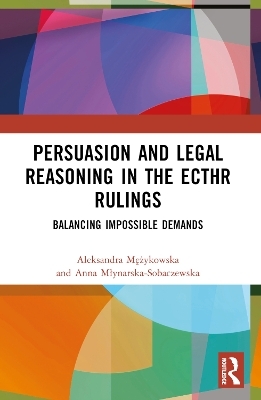
Persuasion and Legal Reasoning in the ECtHR Rulings
Routledge (Verlag)
978-1-032-45222-7 (ISBN)
This book analyses the case law of the European Court of Human Rights (ECtHR) from the point of view of argumentative tools used by the Court to persuade the audience – States, applicants and public opinion – of the correctness of its rulings. The ECtHR judgments selected by the authors concern justification of some of the most difficult issues. These are matters related to human life, human dignity and the right to self-determination in matters concerning one’s private life. The authors looked for paths and repetitive patterns of argumentation and divided them into three categories of argumentative tools: authority, deontological and teleological. The work tracks how ECtHR judges aim to find a consensual, universal and, at the same time, pragmatic and axiologically neutral narrative on the collisions of rights and interests in the areas under discussion. It analyses whether the voice of the ECtHR carries the overtones of an ethical statement and, if so, to which arguments it appeals. The book will be of interest to academics and researchers working in the areas of jurisprudence, human rights law, and law and language.
Aleksandra Mężykowska is an associate professor within the Department of Constitutional Law and European Research at the Institute of Law Studies of the Polish Academy of Sciences and an expert in the Treaty and Legal Department of the Ministry of Foreign Affairs. Her research interests focus on constitutional and human rights law with particular emphasis on the issues related to the application of the European Convention on Human Rights (protection of property rights and reforms of the control system created on the basis of the Convention). Anna Młynarska-Sobaczewska is a professor within the Department of Constitutional Law and European Research at the Institute of Law Studies of the Polish Academy of Sciences. Her research interests focus on the theory of constitutional law (legitimacy of public authorities and constitutional adjudication) and human rights (right to privacy, freedom of press and freedom of artistic creativity). Her research often looks at the relationship between language, persuasion and legal reasoning, as well as legitimising the dimension of legal instruments.
Introduction
1 Challenges of judicial reasoning in beginning and end-of-life cases
2 Ways of judicial reasoning – outline
3 Ways of reasoning in medically assisted procreation and surrogacy cases
4 Ways of reasoning in abortion cases
5 Ways of reasoning in end-of-life situations
Conclusion
Index
| Erscheinungsdatum | 14.09.2023 |
|---|---|
| Verlagsort | London |
| Sprache | englisch |
| Maße | 156 x 234 mm |
| Gewicht | 453 g |
| Themenwelt | Geisteswissenschaften ► Sprach- / Literaturwissenschaft ► Anglistik / Amerikanistik |
| Geisteswissenschaften ► Sprach- / Literaturwissenschaft ► Literaturwissenschaft | |
| Geisteswissenschaften ► Sprach- / Literaturwissenschaft ► Sprachwissenschaft | |
| Recht / Steuern ► Allgemeines / Lexika | |
| Recht / Steuern ► EU / Internationales Recht | |
| Recht / Steuern ► Öffentliches Recht ► Völkerrecht | |
| ISBN-10 | 1-032-45222-6 / 1032452226 |
| ISBN-13 | 978-1-032-45222-7 / 9781032452227 |
| Zustand | Neuware |
| Haben Sie eine Frage zum Produkt? |
aus dem Bereich


